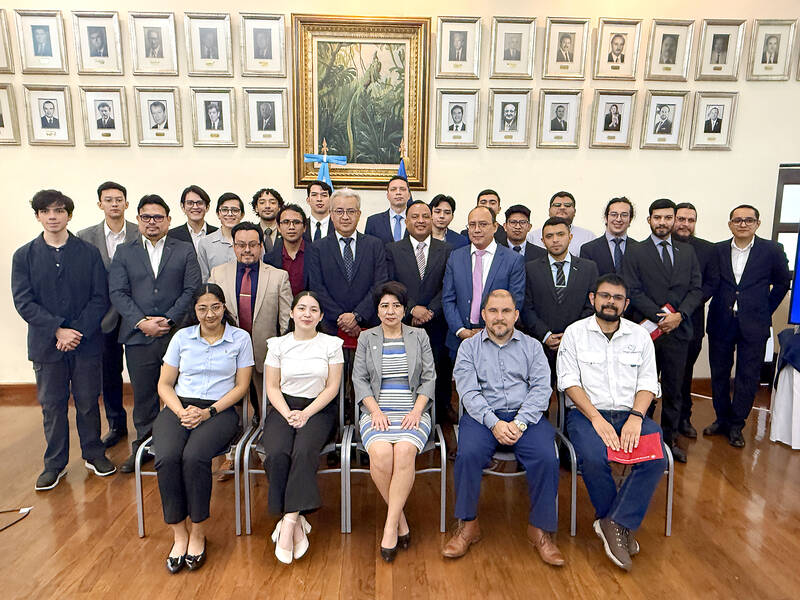Taiwan and Guatemala have initiated a vocational training program for engineering talent to facilitate a bid by the Central American nation to develop a semiconductor industry.
Guatemalan President Bernardo Arevalo has expressed interest in deepening bilateral economic cooperation in technology, Ambassador to Guatemala Chang Chun-fei (張俊菲) said in Guatemala City on Wednesday.
Starting on Thursday next week, a class of 28 top Guatemalan students and researchers would undergo three weeks of intensive training at Hsinchu Science Park (新竹科學園區) and National Yang Ming Chiao Tung University’s Innovation Incubation Center in Taipei, Chang said.

Photo: CNA
The class would visit the manufacturing facilities of members of the Taiwan Printed Circuit Association, she said.
The trainees would become seedling instructors in a planned Guatemala-run education program to train talent and build a domestic chipmaking industry, she said.
The joint venture is part of the Ministry of Foreign Affairs’ efforts to boost the economies of diplomatic allies by leveraging Taiwan’s technological advantages, she said.
The Arevalo administration is conducting a nationwide strategy to attract foreign investors in key industries to bolster the nation’s ability to compete in the global economy, Guatemalan Minister of Economy Gabriela Garcia-Quinn said.
Guatemala aims to become a member of the international semiconductor manufacturing sector, which brings innovation, technology and good jobs, Garcia-Quinn said.
She thanked Taiwan for sharing technology and experience that Guatemala needs to integrate into the global value chain.
The exchange program is evidence of Taiwan’s crucial role as a strategic partner to Guatemala in its quest to build a modern economy, Guatemalan Minister of Foreign Affairs Carlos Ramiro Martinez said.
Carlos Esquit, who heads the electronic engineering department at the Universidad del Valle de Guatemala, said the program would enable the participants to develop a sense for the chipmaking industry.
The ties between the two nation’s public and private sectors that the program would facilitate would help to establish a model for bilateral economic cooperation, Esquit added.

Right-wing political scientist Laura Fernandez on Sunday won Costa Rica’s presidential election by a landslide, after promising to crack down on rising violence linked to the cocaine trade. Fernandez’s nearest rival, economist Alvaro Ramos, conceded defeat as results showed the ruling party far exceeding the threshold of 40 percent needed to avoid a runoff. With 94 percent of polling stations counted, the political heir of outgoing Costa Rican President Rodrigo Chaves had captured 48.3 percent of the vote compared with Ramos’ 33.4 percent, the Supreme Electoral Tribunal said. As soon as the first results were announced, members of Fernandez’s Sovereign People’s Party

MORE RESPONSIBILITY: Draftees would be expected to fight alongside professional soldiers, likely requiring the transformation of some training brigades into combat units The armed forces are to start incorporating new conscripts into combined arms brigades this year to enhance combat readiness, the Executive Yuan’s latest policy report said. The new policy would affect Taiwanese men entering the military for their compulsory service, which was extended to one year under reforms by then-president Tsai Ing-wen (蔡英文) in 2022. The conscripts would be trained to operate machine guns, uncrewed aerial vehicles, anti-tank guided missile launchers and Stinger air defense systems, the report said, adding that the basic training would be lengthened to eight weeks. After basic training, conscripts would be sorted into infantry battalions that would take

EMERGING FIELDS: The Chinese president said that the two countries would explore cooperation in green technology, the digital economy and artificial intelligence Chinese President Xi Jinping (習近平) yesterday called for an “equal and orderly multipolar world” in the face of “unilateral bullying,” in an apparent jab at the US. Xi was speaking during talks in Beijing with Uruguayan President Yamandu Orsi, the first South American leader to visit China since US special forces captured then-Venezuelan president Nicolas Maduro last month — an operation that Beijing condemned as a violation of sovereignty. Orsi follows a slew of leaders to have visited China seeking to boost ties with the world’s second-largest economy to hedge against US President Donald Trump’s increasingly unpredictable administration. “The international situation is fraught

GROWING AMBITIONS: The scale and tempo of the operations show that the Strait has become the core theater for China to expand its security interests, the report said Chinese military aircraft incursions around Taiwan have surged nearly 15-fold over the past five years, according to a report released yesterday by the Democratic Progressive Party’s (DPP) Department of China Affairs. Sorties in the Taiwan Strait were previously irregular, totaling 380 in 2020, but have since evolved into routine operations, the report showed. “This demonstrates that the Taiwan Strait has become both the starting point and testing ground for Beijing’s expansionist ambitions,” it said. Driven by military expansionism, China is systematically pursuing actions aimed at altering the regional “status quo,” the department said, adding that Taiwan represents the most critical link in China’s